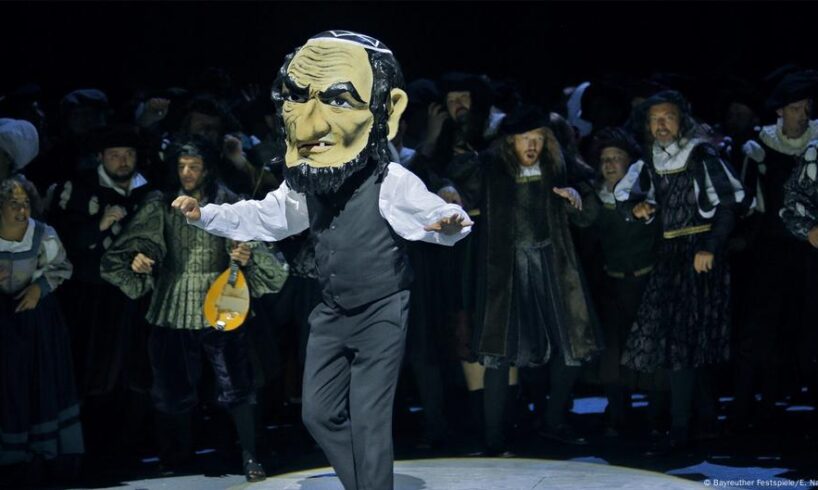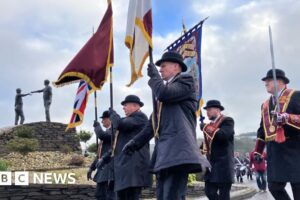
Productions of Wagner’s opera “Die Meistersinger von Nürnberg” divide audiences. Should emphasis be placed on the opera’s comical elements, or is it to be seen as more of a serious play about German virtues with antisemitic undertones?
In this year’s new production at the Bayreuth Festival, director Matthias Davids aims to highlight the opera’s comical side.
Nevertheless, the fact that the Nazis included the piece in their Reich Party Congresses continues to cast a shadow over the production.
Richard Wagner was Adolf Hitler’s favorite composer, long before coming to power in 1933. The dictator saw Wagner as a kindred spirit who had inspired the masses in the 19th century with the powerful sounds of his operas. Adolf Hitler later exploited this for his propaganda.
Art and music were of utmost importance to Hitler
Hitler, who wanted to study art, placed as much importance on large-scale musical productions as he did on state-sponsored architectural projects.
“Hitler did indeed attach great importance to art,” says art historian Wolfgang Brauneis, who has studied artists of the Nazi era. “You can see this even well into the ravages of war, when he was still personally selecting the color of mosaic tiles for large construction sites.”
Mass gatherings at the Nazi Party Rallies in NurembergImage: picture-alliance/arkivi
It was no different in Nuremberg, where Hitler’s National Socialist German Workers’ Party (NSDAP) held its party rallies. He personally selected the singers and conductors for the production of Richard Wagner’s opera “Die Meistersinger von Nürnberg,” which was performed on the eve of the Reich Party Rallies.
The concept of the Gesamtkunstwerk for Wagner and Hitler
When Hitler came to power in 1933, Richard Wagner had already been dead for 50 years. With his concept of a Gesamtkunstwerk, or total work of art, the composer had revolutionized the world of opera. He envisioned a symbiosis of text, music, directing, stage design and architecture, all according to the vision of a single person.
Richard Wagner designed an opera house on the green hill in Bayreuth specifically for his operas. He was the first to have the orchestra play from a pit in front of the stage while the audience sat in complete darkness, with only the stage illuminated. This inspired Hitler.
The 1936 Reich Party Rally had a special lighting concept by architect Albert SpeerImage: Museen der Stadt Nürnberg/Dokumentationszentrum Reichsparteitagsgelände
From 1935 onwards, the dictator staged his Nuremberg rallies like a big stage spectacle with a special lighting design and huge mass gatherings. The entire city became a backdrop, with flags raised along the streets for the Nazis to march along.
In the final scene of “Die Meistersinger von Nürnberg,” which is about the preservation of German art, set designer Benno von Arent used the long rows of flags in front of the city’s medieval half-timbered houses as a backdrop for the stage.
Benno von Arent’s stage concept for ‘Die Meistersinger von Nürnberg’ in 1938Image: Museen der Stadt Nürnberg/Dokumentationszentrum Reichsparteitagsgelände
A quintessential German opera that promotes antisemitism?
The opera is about a singing contest for the love of a woman. Bakers, tailors, goldsmiths and other master craftsmen go head-to-head. The town scribe Beckmesser carefully makes sure everyone follows the rules. Master craftsman Hans Sachs, a respected singer and shoemaker, urges everyone to honor the old masters and preserve German art.
This is one reason why “Die Meistersinger von Nürnberg” is often described as Wagner’s most German opera. Jewish Australian director Barrie Kosky agrees. He feels, however, that antisemitism also plays a role. In 2017, he staged “Die Meistersinger” in Bayreuth as a “witch hunt against a Jewish singer,” whom he associates with the character of Beckmesser.
“I am not dealing with Jewish culture. I’m dealing with the parody of antisemitism,” Kosky explains in the DW film “Why Hitler adored Wagner.”
Why Hitler adored Richard Wagner
To view this video please enable JavaScript, and consider upgrading to a web browser that supports HTML5 video
What is important for Kosky is that Beckmesser is made into the scapegoat — into the person who must bear the responsibility. In Kosky’s production, Beckmesser is made into the Jew.
Whether Jewish characters are portrayed and caricatured in what way in Wagner’s operas remains a matter of debate among Wagner scholars to this day. Wagner himself reportedly never commented on the issue. However, the composer was an avowed antisemite. He wrote a pamphlet entitled “Judaism in Music,” in which he vilified music by Jewish composers and claimed that they were only capable of copying others.
Music historian Jens Malte Fischer sees concrete antisemitic references in Wagner’s “Meistersinger.” In the singing competition, the town clerk Beckmesser sings especially badly, and he also steals the songs of others. “This ‘wailing’ is described by Wagner in ‘Judaism in Music’ as a hallmark of synagogue music. And he says: How can anyone sing like that? That’s just awful. It seems to me that this is what Wagner is mocking here very emphatically,” he says in the DW film.
Preparing the list of participants in the singing competition: A scene from Kosky’s 2021 staging of the operaImage: Enrico Nawrath/Bayreuther Festspiele
Intrigue, love, power, victory and heroism are ingredients that Richard Wagner repeatedly uses in his operas. The “Meistersinger” was therefore held up by the National Socialists as a quintessentially German opera with great pathos and solemnity, but there are also comedic aspects to the singing competition. This is what is central to the new production by opera and musical director Matthias Davids at this year’s Bayreuth Festival.
There are many comical situations and moments in the libretto of “Die Meistersinger,” Davids told the press in Bayreuth. “There is verbal comedy and situational comedy,” and some characters clearly fall into the category of comic roles. “I have been discovering more and more humorous elements that may come as a surprise.”
In the festival program, he raises the question of whether the “honor of the German master” that is extolled in the finale can really only be understood as a condemnation of everything that is not “German and genuine.”
“Couldn’t we all become masters if we finally learned to treat ourselves and others with more love?”
The premiere of Die Meistersinger at the Bayreuth Festival will take place on July 25. The festival ends on August 26.
This article was originally written in German.





